Judy visits the garden of Dianne and Chris Newman, from Macleod
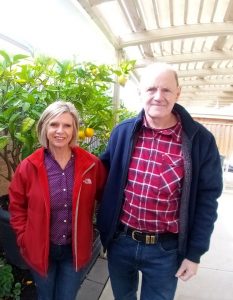 Some of you will know Dianne or Chris through their involvement in the Macleod Organic Community Garden and the Macleod Veggie Swap. Some of you might even have been served one of the pizzas that they make in the community garden’s pizza oven! Judy Vizzari has now visited their garden and talked to Dianne and Chris as home growers.
Some of you will know Dianne or Chris through their involvement in the Macleod Organic Community Garden and the Macleod Veggie Swap. Some of you might even have been served one of the pizzas that they make in the community garden’s pizza oven! Judy Vizzari has now visited their garden and talked to Dianne and Chris as home growers.
As Judy says in the introduction to her writeup: “If you were to drive past Chris and Dianne’s suburban block you could be excused for not noticing anything unusual. Theirs is a neat, relatively new, two-storey brick home with a garden seemingly laid bare by winter. It fits well into the landscape, but it’s not ‘different’. You’d be wrong, though, to assume that not much happens in its garden.” Particular features include a computerised irrigation system covering the whole garden, a hanging garden of pots, and a large quince tree. Read the full writeup.
Robin discusses growing broad beans
[Editor’s note: broad beans are traditionally planted in Autumn but Robin is saying that the planting window is actually much greater than that and extends across Winter and Spring.]
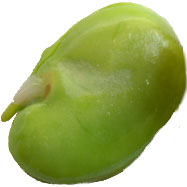 Broad beans can be sown from Autumn to Spring, and now is a good time to plant them. Whilst Autumn-sown plants are ready for harvest in 25 weeks, spring-sown are ready in 15 weeks. Shelter from the wind if possible. To prepare your beds, dig in a low nitrogen, well-rotted animal manure such as cow, sheep or horse plus compost. Sprinkle potash at the rate of 1 tablespoon per square metre to strengthen plant stems and encourage flowering.
Broad beans can be sown from Autumn to Spring, and now is a good time to plant them. Whilst Autumn-sown plants are ready for harvest in 25 weeks, spring-sown are ready in 15 weeks. Shelter from the wind if possible. To prepare your beds, dig in a low nitrogen, well-rotted animal manure such as cow, sheep or horse plus compost. Sprinkle potash at the rate of 1 tablespoon per square metre to strengthen plant stems and encourage flowering.
Plant spacing is generally 20-30 cm apart. Planting depth is recommended between 2-10 cm. I always plant at least 5cm deep to avoid rats eating the seed. Soak your seed in either water or a weak seaweed solution overnight and, once planted, water the seed in and don’t water again until the shoots emerge above ground.
Broad beans don’t suffer many pests but snails can be a problem. Black tip and spot is a fungal problem that is caused by poor drainage and black fly can infest tender top shoots.
Broad beans convert nitrogen from the air into nitrogen root nodules so, when the crop has finished, slash it and dig in the stalks and roots to add valuable nitrogen to your soil. You can also cut the stalks at their base and leave the roots intact in the soil and dig the shredded stalks into another bed.
Broad beans are delicious when young and small but tough when they are older and bigger (which sometimes gives them an undeserved, poor reputation).
[Editor’s note: This is a much shortened version of Robin’s article. You can read the full article on our website, where you can also read all her other articles.]
Community gardening news
Our website has now been extended to include pages for the various community gardens in the City of Yarra. More specifically: Balam-Balam in Carlton North, Condell Growers and Sharers in Fitzroy, Finbar Neighbourhood Garden in Richmond, Richmond Community Garden Group and Rushall Community Garden in Fitzroy North. Each is a bit different than the norm so each page is worth a read. Welcome Anne, Bonnie, Cathryn, Elle, Julie and Kath!
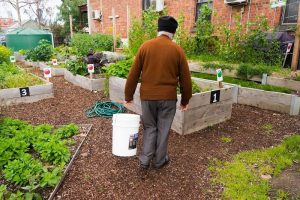 |
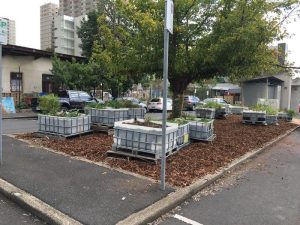 |
 |
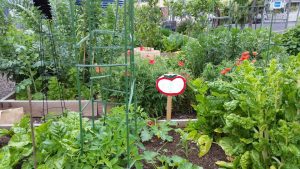 |
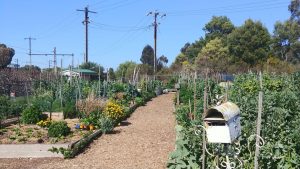 |
| Balam-Balam | Condell Growers and Sharers | Finbar Neighbourhood Garden | Richmond Community Garden Group | Rushall Community Garden |
Free horse manure
Dani Mallia, from the North Eastern Horse & Pony Club, has written in to remind people that they have lots of horse manure available for free all year round. Drive in at any time and load up as much as you like. 451, Banyule Road, Viewbank.
In addition to the North Eastern Horse & Pony Club, 7 other sources of free horse manure are listed on our website, including at East Ivanhoe, Eltham, Lower Plenty, Warrandyte and Kangaroo Ground.
Long Winter food drive – the results
 In the 19th June newsletter, I discussed Montmorency Asylum Seekers Support Group’s (MASSG) initiative to help re-stock the Asylum Seeker Resource Centre’s (ASRC’s) Foodbank, which provides meals and food basics to around 700 people seeking asylum and refugees each week, most of whom have no income. Lyn Richards has written in to say that they have had a great response (as the picture right of her living room attests to!), adding: “People donate with pleasure and far more generously if they’re giving cans of beans, not money. Food feels like they’re connecting; buying the beans helps them relate to a family that can’t just go buy food. Food somehow triggers empathy and sharing. Hard then to buy the stereotyping and alienating language of ‘illegals’. So this sort of labour intensive campaign – much more hard work than taking donations online – does make sense, as does the ASRC’s amazing grocery store approach to feeding all those people with no income. 90% of the food that they use every week is donated.“
In the 19th June newsletter, I discussed Montmorency Asylum Seekers Support Group’s (MASSG) initiative to help re-stock the Asylum Seeker Resource Centre’s (ASRC’s) Foodbank, which provides meals and food basics to around 700 people seeking asylum and refugees each week, most of whom have no income. Lyn Richards has written in to say that they have had a great response (as the picture right of her living room attests to!), adding: “People donate with pleasure and far more generously if they’re giving cans of beans, not money. Food feels like they’re connecting; buying the beans helps them relate to a family that can’t just go buy food. Food somehow triggers empathy and sharing. Hard then to buy the stereotyping and alienating language of ‘illegals’. So this sort of labour intensive campaign – much more hard work than taking donations online – does make sense, as does the ASRC’s amazing grocery store approach to feeding all those people with no income. 90% of the food that they use every week is donated.“
How to plant bare rooted fruit trees
Newsletter reader Chloe Thomson has published a video about how to plant bare rooted fruit trees.
What seeds to plant in August
Here is a list (see the planting guide for more detail):
Leafy greensLettuce |
AlliumsLeeks |
Warm season veggiesCapsicum |
OtherAsparagus |
As Spring begins to beckon, the list begins to grow. Note that the warm season veggies can only be planted if under cover in seed trays.
Which link was clicked most times in the last newsletter?
Home delivery of fruit/veggie boxes by postcode/suburb.
Proverb of the month
Eat humble pie. Meaning: act submissively and apologetically when admitting an error. ‘Humble pie’ is a corruption of ‘umble pie’ which itself is a corruption of ‘numble pie’, where numbles in 14th Century England were the heart, liver and other entrails of deer and other animals (in other words, offal). ‘Humble’ also means ‘not proud’ (and is apparently derived from ‘humus’, which can be used to mean ‘grounded’ or ‘from the earth’). In a play on words, some unknown person took these two unrelated meanings of the word ‘humble’ to create the idiom ‘eat humble pie’.
The adding or dropping of an ‘n’ at the start of a word over time is apparently quite common in English. For example, (n)adder, (n)apron, (n)ewt, (n)otch, (n)umpire. The reason is that, because English uses ‘an’ rather than ‘a’ when the noun begins with a vowel, the versions with or without an ‘n’ sound the same. For example, ‘an apron’ versus ‘a napron’. These additions/deletions are apparently called ‘rebracketing’ or ‘metanalysis’.
Gardening quote of the month
“The greatest service which can be rendered any country is to add a useful plant to its culture.” by Thomas Jefferson.
Joke of the week
Why is parsley better than Justin Bieber? Because everything is better than Justin Bieber.
New events – not cooking
Cheesemaking – the art and science of cheese: Tuesday, 13th August, 6-7pm; Lilydale Library.
What: Discover all about making your own cheese with Anna Ladner from Coldstream Dairy and try some of the cheeses that Anna makes herself.
Cost: free.
Bookings: their website.
Chook keeping and Chooks4Charity: Tuesday, 3rd September, 4.30-6.30pm; Chirnside Park.
What: This event is for people from schools or early learning centres in Manningham, Maroondah, Whitehorse or Yarra Ranges. See chook keeping in action and hear from Chooktopia about the best ways to keep chickens in an educational setting. You will also have the opportunity to hear from Oxley Christian College on their Chooks4Charity program that students set up as part of their Student Leadership Program.
Cost: $10.
Bookings: EventBrite.
Portable wicking bed demo: Sunday, 8th September, 11.30am-12.30pm; Northcote Library.
What: Learn to create and maintain a wicking bed that is perfect for urban dwellers. Kerrie will show you how to recycle scrap from around the community to create your own portable garden bed.
Cost: free.
Bookings: Facebook.
Veggie gardening for beginners: Saturday, 21st September, 9.30am-12.30pm; Bulleen Art and Garden.
What: What you will learn: how to set up and prepare a vegetable garden; how to select, plant and care for crops; and how to grow veggies in the ground, in raised beds and in pots. Presented by Nicole Griffiths. This class will teach you everything you need to know to grow delicious produce in your own backyard. They will cover all of the veggie gardening basics, from setting up your patch to harvesting.
Cost: $55.
Bookings: WeTeachMe.
Tomato talk, book sales & signing: Thursday, 26th September, 7-8pm; Brunswick.
What: Go along to hear some tomato growing tips from Karen Sutherland. Learn how to prepare your soil properly, when and how to protect your plants, and the pros and cons of various pruning and training techniques. Discover the world of heirloom tomatoes.
Cost: free.
Bookings: just turn up.
Native plants for food and medicine: Saturday, 28th September, 9.30am-12.30pm; Bulleen Art and Garden.
What: What you will learn: traditional Indigenous lifestyles and healing practices pre European settlement; traditional ways of using various Indigenous plants for medicinal purposes; and promising new research into their potential medical applications. Presented by Gaby Harris. Indigenous Australians have been using native plants and animals for tens of thousands of years as sources of food and medicine. With European settlement much of this knowledge was lost or ignored, but there is now growing interest in relearning these traditional healing methods. More research is being carried out to see how we can grow, harvest and utilise our Indigenous plants for foods, medicines, cosmetics and more. This class will introduce you to some of the well-known, as well as some more obscure, Indigenous Australian plants, teach you how they were once used, and how you can use them now. You will be able to see, smell and taste a variety of these amazing plants and learn where you can find them and how to cook with them.
Cost: $55.
Bookings: WeTeachMe.
New events – cooking
Vegan and gluten-free cooking class: Sunday, 8th September, midday-4pm; Smiths Gully.
What: There will be 5-8 dishes in total. Everything will be vegan and gluten-free and will include staples, mains, desserts, raw and a brunch dish.
Cost: $100 (includes sit down 3-course meal).
Bookings: their website.
Basic bakes: Saturday, 21st September, 10-11.30am; Kitchen Warehouse, Box Hill South.
What: Learn how to get the consistent results you’ve always dreamed of! They will share with you the tips and tricks behind a successful bake, from monitoring oven temperatures to choosing the ideal equipment. They will also show you how versatile butter cake can be by turning it into a apple-flavoured dessert and a chocolate marble creation.
Cost: $30.
Bookings: their website.
Petit gateaux: Saturday, 21st September, 12.15-1.45pm; Kitchen Warehouse, Box Hill South.
What: Level up your pastry skills and learn how to assemble little French cakes using mousses and cremeux. Learn show to put a brownie base, raspberry gel insert, chocolate mousse, and glaze together.
Cost: $30.
Bookings: their website.
Summary of upcoming events – not cooking
Over the next week
- Smarter living – the story of Oz Harvest: Wednesday, 31st July, 7-9pm; Manningham Civic Centre.
- Retrosuburbia book club: Thursday, 1st August, 7.30-9pm; Central Ringwood Community Centre.
- Introduction to beekeeping (6 sessions): 6 Wednesdays from 1st August, each 5.30-8pm; Fairfield.
- 2040, Join the Regeneration (film): Thursday, 1st August, 6.30-8pm; Mill Park.
- Winter fruit tree pruning with Chris England: Saturday, 3rd August, 10am-1pm; Richmond.
- Home composting workshop: Saturday, 3rd August, 2-4.30pm; Edendale.
- Intro to permaculture (two days): Saturday, 3rd August and Saturday 10th August, both 10am-3pm; CERES, Brunswick East.
- Grafting and tree sales day: Sunday, 4th August, 10am-1pm; Pettys Orchard, Templestowe.
- Food, fibre and medicine – the traditional uses of indigenous plants: Monday, 5th August, 7.30-9pm; Nunawading.
Over the next month
- Scion and tree sales day: Saturday, 10th August, 9am-midday; CERES.
- Winter fruit tree maintenance: Saturday, 10th August, 9.30am-12.30pm; Bulleen Art and Garden.
- Wicking beds: Sunday, 11th August, 1-3pm; Hurstbridge.
- Supermarket tour: Monday, 12th August, 10-11.15am; Surrey Hills.
- Cheesemaking – the art and science of cheese: Tuesday, 13th August, 6-7pm; Lilydale Library.
- Beeswax wrap workshop: Wednesday, 14th August, 6-8pm; Balwyn North.
- 2040, Join the Regeneration (film): Wednesday, 14th August, 7-8.30pm; Greensborough.
- Jainie on Nuetrog’s ‘Who Flung Dung’: Wednesday, 14th August, 7.30-10pm; Doncaster Garden Club.
- Living The Change (film): Thursday, 15th August, 7-8.30pm; Watsonia Library.
- Mould – a cheese festival: Friday, 16th August, 4-8pm and on Friday, 16th August and Saturday, 17th August, 11am-8pm; Meat Market, North Melbourne.
- The art of espalier: Sunday, 17th August, 9.30am-midday; Bulleen Art and Garden.
- Beeswax wraps: Sunday, 18th August, 10am-midday; Park Orchards.
- Kitchen gardens for schools and the community: Sunday, 18th August, 10am-3pm; CERES, Brunswick East.
- Supermarket tour: Monday, 19th August, 4-5.15pm; Surrey Hills.
- 2040, Join the Regeneration (film): Monday, 19th August, 7-8.30pm; Northcote.
- Raised garden beds are for everybody: Thursday, 22nd August, 10.30-11.30am; Fawkner Library.
- Growing fruit and veggies in small spaces: Saturday, 24th August, 9.30am-12.30pm; Bulleen Art and Garden.
- Beekeeping workshop: Saturday, 24th August, 2-4.30pm; Bee Sustainable, Brunswick East.
- Healthy productive compost and worms: Saturday, 25th August, 9.30am-12.30pm; Bulleen Art and Garden.
- Espresso coffee making workshop: Wednesday, 28th August, 1-4pm; Coburg.
- Beeswax wraps and candlemaking workshop: Thursday, 29th August, 10am-midday; Wonga Park.
- Making composting and worm farming easy: Thursday, 29th August, 7-8.30pm; Mill Park Library.
Summary of upcoming events – cooking
Over the next week
- Cook Indian by the creek: Wednesday, 31st July, 6.15-8pm; Diamond Creek.
- Cooking master class: Thursday, 1st August, 7-9pm; Gourmet Living, Templestowe.
- Vegan Mediterranean cooking: Friday, 2nd August, 10am-midday; Wonga Park.
- Indian cooking and spices workshop: Friday, 2nd August, 6-8pm; Surrey Hills.
- Cook Indian by the creek: Friday, 2nd August, 6.30-8pm; Diamond Creek.
- Seasonal ferments – kimchi + kombucha: Saturday, 3rd August, 9-11.30am; Bee Sustainable, Brunswick East.
- No Waste Cook Club: Saturday, 3rd August, 10am-midday; North Fitzroy Library.
- Homestyle Japanese with Chef James Cornwall and Mr Global: Saturday, 3rd August, midday-1.30pm; Kitchen Warehouse, Preston.
- Fermenting basics: Sunday, 4th August, 11am-12.30pm; Kitchen Warehouse, Box Hill South.
Over the next month
- Fermented foods – kombucha workshop: Friday, 9th August, 6-8pm; Surrey Hills.
- Cook Indian by the creek: Friday, 9th August, 6.30-8.30pm; Diamond Creek.
- Pickling basics and techniques: Saturday, 10th August, 10-11.30am; Kitchen Warehouse, Preston.
- Homemade preserves and jams: Saturday, 10th August, 12.30-2pm; Kitchen Warehouse, Preston.
- Asian-inspired cooking demonstration: Saturday, 10th August, 1-3pm; Chirnside Park.
- War on kitchen waste with Jesse Alice: Sunday, 11th August, 11am-12.30pm; Kitchen Warehouse, Box Hill South.
- Family friendly vegan cooking class: Sunday, 11th August, midday-4pm; Smiths Gully.
- Taste of the East cooking demonstration: Tuesday, 13th August, 1-3pm; Ringwood North.
- Sauerkraut and gut health: Tuesday, 13th August, 7-8.30pm; Hawthorn Community House.
- Fakeaway cooking – making takeaway in your home (thermomix): Tuesday, 13th August, 7.30-9pm; Kilsyth.
- Cookie cake and fondant cookies with Emelia Jackson: Thursday, 15th August, 7-9pm; Gourmet Living, Templestowe.
- Cooking for one (5 sessions): 5 sessions starting Friday, 16th August, 1-3pm; Chirnside Park.
- Sausage making workshop: Friday, 16th August, 5.30-7pm; Kitchen Warehouse, Preston.
- Cook Indian by the creek: Friday, 16th August, 6.30-8pm; Diamond Creek.
- Cookie cake and fondant cookies with Emelia Jackson: Friday, 16th August, 7-9pm; Gourmet Living, Templestowe.
- Mozzarella and ricotta cheesemaking workshop: Saturday, 17th August, 9-11.30am; Bee Sustainable, Brunswick East.
- Sourdough bread making with Nadine Kemp: Saturday, 17th August, 10am-2.30pm; Lower Templestowe.
- Men in the kitchen: Saturday, 17th August, 11am-1pm; Wonga Park.
- Family friendly vegan cooking class: Sunday, 18th August, midday-4pm; Smiths Gully.
- Fermented foods – sauerkraut workshop: Friday, 23rd August, 6-8pm; Surrey Hills.
- Cooking master class – ‘lamb lovers’: Friday, 23rd August, 7-9pm; Gourmet Living, Templestowe.
- Sourdough bread: Saturday, 24th August, 9.30am-12.30pm; Park Orchards.
- Basic knead – beginners to bread: Saturday, 24th August, 10-11.30am; Kitchen Warehouse, Preston.
- Tapas – taste of Spain: Saturday, 24th August, 10-11.30am; Kitchen Warehouse, Box Hill South.
- Seafood paella: Saturday, 24th August, midday-2pm; Kitchen Warehouse, Box Hill South.
- Vegan brunch cooking class: Sunday, 25th August, 11am-3pm; Smiths Gully.
- Kinesiology food testing – customise your nutrition: Thursday, 29th August, 7-8.30pm; Wonga Park.
- Cooking master class – ‘meat lovers’: Thursday, 29th August, 7-9pm; Gourmet Living, Templestowe.
- Nonna & Mum’s homestyle cooking class: Thursday, 29th August, 7.30-10.30pm; Thornbury.
- Cook Indian by the creek: Friday, 30th August, 6.30-8pm; Diamond Creek.
- Cooking master class – ‘meat lovers’: Friday, 30th August, 7-9pm; Gourmet Living, Templestowe.
